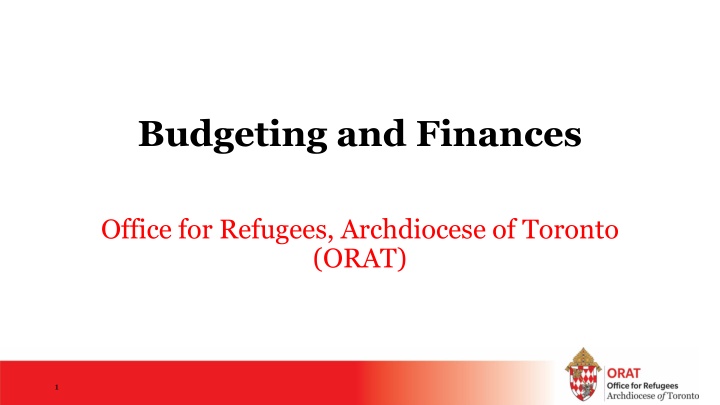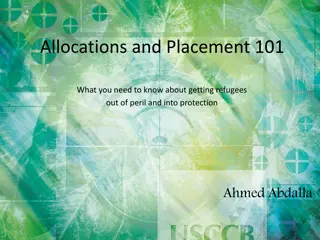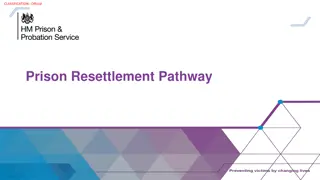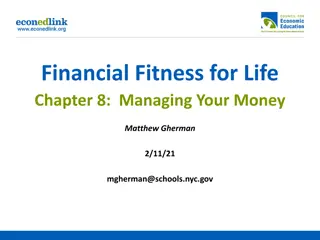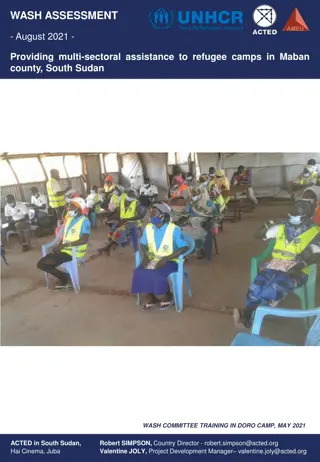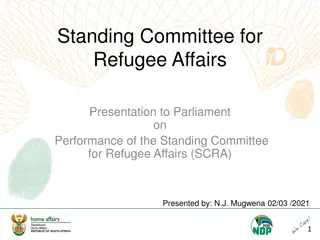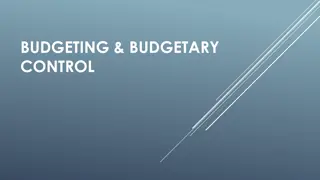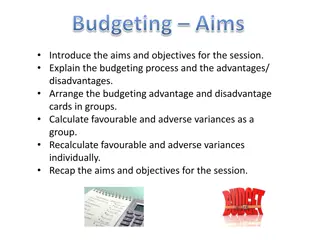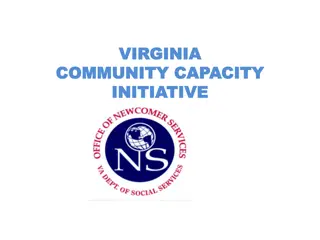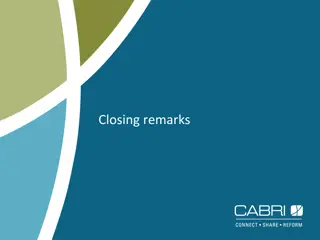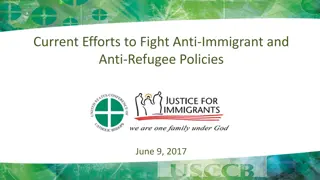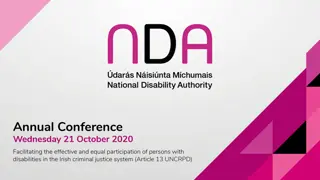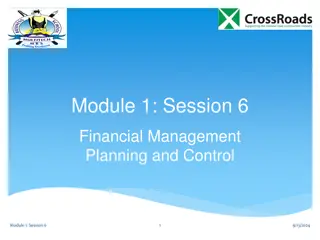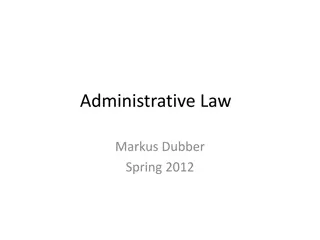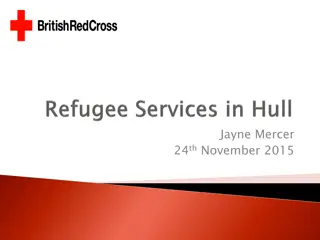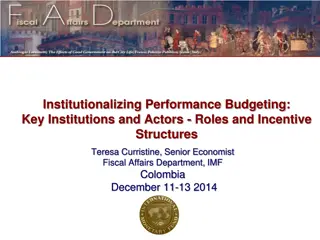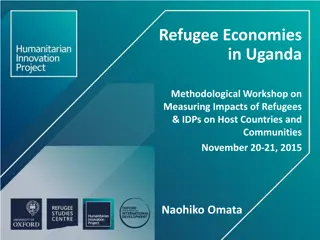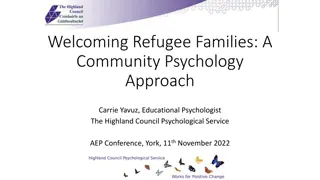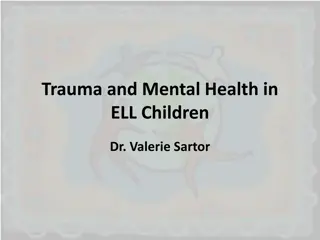Financial Support and Budgeting Guidelines for Refugee Resettlement
Explore the financial requirements and budgeting responsibilities for refugee resettlement programs, including principles for sustainable solutions and autonomy. Learn about the level of financial support required, in-kind support options, handling adult dependents, and guidelines for supporting independent adult children within the sponsorship period.
Download Presentation

Please find below an Image/Link to download the presentation.
The content on the website is provided AS IS for your information and personal use only. It may not be sold, licensed, or shared on other websites without obtaining consent from the author.If you encounter any issues during the download, it is possible that the publisher has removed the file from their server.
You are allowed to download the files provided on this website for personal or commercial use, subject to the condition that they are used lawfully. All files are the property of their respective owners.
The content on the website is provided AS IS for your information and personal use only. It may not be sold, licensed, or shared on other websites without obtaining consent from the author.
E N D
Presentation Transcript
Budgeting and Finances Office for Refugees, Archdiocese of Toronto (ORAT) 1
Agenda Resettlement Principles IRCC Financial Requirements Funding Guidelines (Official Liability & In-Kind Support) Constituent Groups ( CG ) Budget Responsibilities Financial Forms Cheque Requests Increased Monitoring by IRCC 2
Resettlement Principles Principles to guide newcomer relationship Share and work towards building open relationships. Provide clear guidelines and expectations. Build Trust Funds intended to cover basic living expenses. Ensure that the budget & settlement plan is sustainable in nature, which the newcomer is able to afford beyond the settlement period. Sustainable Solution 3
Financial Requirements Level of Financial Support Required The sponsor must provide sufficient income support to at least the minimum financial requirements as per Resettlement Assistance Program (RAP) for the duration of the sponsorship period which is one year or less than one year if the refugee becomes self-sufficient. RAP In-Kind Support The total sponsorship costs may be reduced through the donation of "in- kind" goods, which may include lodging, furniture and clothing. At all times, the newcomers should have the responsibility to manage his or her own financial affairs Autonomy 4
Age of Majority (Adult Dependents) Adult dependents Children who have reached the age of majority (18 years of age) at the time of their arrival to Canada are to be supported at the same level as a single individual (including RAP & Start-up costs) Where adult dependents reside with their parents, cosponsors may apply certain reductions to shared costs. Reductions can happen based on the in-kind donations guidelines. 5
Adult Adult children wanting to live independently from their parent(s) dependents If an adult-aged child chooses to move out on their own within the sponsorship period, the CG/cosponsor may choose to either support two separate households, or to ask ORAT to initiate a no-fault breakdown process with IRCC. The CG/cosponsor is required to continue their support to the larger family unit. CG/cosponsor must contact ORAT for assistance in these situations. 6
Financial Requirements Canada Child Benefit (CCB) Sponsors are not permitted to reduce their level of financial support to the newcomer because the newcomer receives Canada Child Benefits (CCB). A sponsor cannot require a newcomer to direct monies received from CCB towards the costs of settlement; having the effect of reducing the sponsor s level of financial support to the newcomer. There is no specific guidance on how newcomers are to use their CCB. 7
Financial Requirements Earned Net Income Newcomers are permitted to earn up to 50% of their monthly basic RAP rate without incurring any reduction in the level of financial support from the sponsor in that month. Exception Where the employment income is earned by a refugee who is attending secondary school on a full- time basis, the income is not to be included in the total of the family earnings. If earned net income exceeds 50% of their monthly basic RAP, the sponsor may deduct dollar for dollar from their monthly support. 50% of Monthly RAP $375 Family Size Monthly RAP 1 $750 Reduction in Sponsor Support Monthly Support from Sponsor Scenario Earned Income Earning up to 50% of RAP $375 $0 $750 Earnings exceeds 50% of RAP $500 $125 $625 8
Financial Requirements Project Hope cases Re: Earned Net Income While cosponsors may apply a threshold that is greater than the 50% guidelines specified by IRCC, it is mandatory for Constituent Groups (CGs) who are receiving fund from Project Hope to strictly implement this rule and apply the appropriate deductions (i.e. CGs are to deduct from their monthly financial support to the newcomer, an amount equivalent to the net earned income that is above the 50% RAP threshold). Newcomers are expected to voluntarily share their monthly income with their cosponsors or CGs. This will help ensure that we are able to help as many refugees as possible with the limited donations that have been so generously donated. 9
Personal Asset Exemption Financial Requirements Personal assets are things that persons might own Personal Asset Exemption (CAD) Family Composition before arriving in Canada, or have in their possession when they arrive to Canada. Refugees receiving Single person $5,000 financial support are expected to provide information Couple $7,500 about their funds and assets as this may impact the Single plus one dependant $7,500 level of financial support that is to be provided. Each additional dependant $2,500 Example: The personal asset exemption for a family of 4 (mother father and 2 children) is $12,500. 10
Financial Liability: Cost Table & RAP *By the time of arrival, if the financial liabilities are higher than the current numbers, it is the responsibility of cosponsors to provide any additional funds. Family Size Estimated amounts for cases submitted in 2020 (Expected 2022 Arrival) Dependent Adults:Immigration Canada ( IRCC ) defines dependent adults as unmarried children age 16 or older and less than 22 years of age. For the purposes of IRCC forms, dependent adults are considered as part of the family unit, and are to be included in the one set of forms for the family. $18,300 $27,500 $29,600 $31,800 $34,000 $35,500 1 2 3 4 However, IRCC treats dependent adults differently from a financial perspective, requiring additional monies to be provided for every dependent adult in the family. For example: The finances required for a family of 4 (father, mother, one child age 12, and one child age 17) are to be calculated as a family of 3 + 1 ($29,600+$18,300=$47,900) and not as a family of 4 ($31,800). Please take this into consideration when calculating the total cost of sponsorship. 5 6 7 or more, for each additional member, add $1,500 ** If you are sponsoring seniors (age 60 or older) you may be requested to deposit additional funds given the higher RAP Rates . ***Please be aware that it is illegal to cover the financial liability by funds from refugees. 11
In-kind Deductions Sponsorship costs can be reduced by providing in-kind support. CGs are encouraged to solicit in-kind donations Percent of RAP RAP/Start-up Category Details Frequency Includes housing costs, utilities, etc. Shelter Ongoing (monthly) 100% Includes: Basic clothing needs and seasonal needs such as: winter coat, boots, mittens, scarf, snow pants, rain wear, etc. Clothing One-time start-up 70% Includes: bed frame or crib, dining set, couches, end table, lamps, etc. Furniture One-time start-up 70% Includes basic window coverings & common household products (e.g., kitchen utensils, pots, pans, brooms, mops, detergents and cleansers, etc) Household Needs One-time start-up 50% Includes: bedding, towels, etc. Linens One-time start-up 100% Not including registration costs School supplies One-time start-up 50% New, unopened pantry items (rice, flour, sugar, spices, etc.) Food staples One-time start-up 50% 12
Budget Worksheet Tool Available A budget tool has been created by ORAT to assist sponsors with helping to manage the finances of their refugees. Sponsors can request this budget tool to be sent to them by emailing ORAT at Oratoutreach@archtoronto.org This budget tool allows the user to develop a budget and record actual income and expenses. It also provides a full year forecast. 13
Budget Cosponsor/Constituent Groups (CG) Budget Responsibilities Responsibilities Detail Responsibility Develop a monthly budget for the settlement period. Review budget with the newcomer and ensure alignment. Develop the Budget Where practical, at the end of each month review with the newcomer actual expenses versus budget targets. Ongoing Review Using the Cheque Requisition form, CG s or cosponsors can make a request of ORAT for monies required for settlement. Request Funds 10
Cheque Requests Accessing Settlement Funds All Cheque Request Forms to be completed by cosponsors or CGs chairs 1st installment: will be released by ORAT upon receipt of a completed Cheque Request Form and receipt of the Notification of Arrival Transmission (NAT) equal to 1st 3 months of support plus start-up costs. The 1st cheque can be made out to cosponsors or CG representative 2nd, 3rd & 4th installments: Cheque to be made out to the newcomer in cosponsored cases and to the CG in Project Hope cases. A Cheque Request Form must be completed and submitted for each installment. When the newcomer becomes self-sufficient and monies on deposit with ORAT are no longer required to support the newcomer, we ask that any over payment be worked out between the cosponsor/CG and the newcomer. If this is not possible, please contact our office. Since it takes about 4 weeks for cheques to be processed, we ask that you submit a cheque request for the next instalment by the end of the second month of each quarter. 15
Cheque Request Form The Cheque Request Form is to be used to request funds for settlement. The form can be downloaded from ORAT website using the following link: https://www.archtoronto.org/refugee/ Pages/Forms-2.aspx 2 forms are available (please use correct form): 1. Cosponsors 2. Constituent Groups CGs (Project Hope/ Full sponsorship cases) 16
Monitoring Increased Monitoring by IRCC IRCC has increased its monitoring of refugee cases to ensure that all stakeholders are fulfilling their obligations and responsibilities. As part of IRCC s monitoring efforts, IRCC has been arranging for newcomers to complete a questionnaire (in-person meeting, by phone, or by email). This they have done without notifying the SAH, CG or cosponsor. All parties should take increased vigilance to ensure that IRCC s updated rules are being followed. All settlement support is to be well documented. Avoid cash disbursements. 17
Thank you You are also asked to attend the following Info sessions: IRCC Processing Time Pre-Arrival Budget Workbook Welcome Orientation (with your newcomer) Register: www.orat.eventbrite.ca 18
